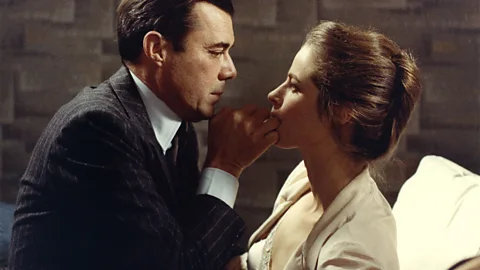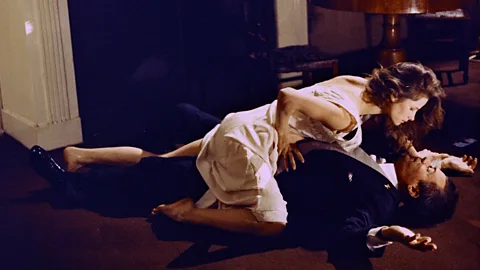The Night Porter: Is this the most controversial film ever made?
 Alamy
AlamyFifty years after Liliana Cavani's provocative and disturbing film The Night Porter was released to widespread critical disgust, how have views of it changed?
"To write a poem after Auschwitz is barbaric," wrote the German theorist Theodor Adorno, suggesting, in his 1949 essay Cultural Criticism and Society, that artistic expression had been rendered inadequate as a tool to understand reality after the Holocaust. In her 1974 film The Night Porter, Italian director Liliana Cavani challenged this theory, taking it to its logical extreme. She used a concentration camp as the setting to explore a crazed sexual bond between an adolescent prisoner and an SS commandant, and how, years later, this psychological poison has pervaded their souls.
Amid the furore after its release – which included intensely negative reviews from both sides of the Atlantic, and an attempted ban by the Italian ratings board – with typical nonchalance, Cavani told The New York Times: "This is nothing compared to the numberless couples who tear each other apart psychologically."
Half a century on, however, does The Night Porter still seem like a provocation that plumbs the depths of bad taste? With the film's recent restoration and re-releases, as well as renewed conversations around cinematic depictions of the Holocaust, many have revisited the film and remain unimpressed by its content. Others are perhaps seeing the film more as Liliana Cavani originally intended: as an artistic reflection of how sexual obsession – in all its often-misplaced fervour – can be fascistic in its tunnel-visioned ferocity. Cavani herself put it more simply: "love comes always with a price to pay".
The Night Porter is set in Vienna in 1957, where a former Nazi commandant, Max (Dirk Bogarde), works in an upmarket hotel. There, he clashes with former SS colleagues who are determined to purge themselves of any shame about their roles in the Final Solution and eliminate any surviving witnesses. Max, however, would rather forget his past and move on, living his life quietly, he says, "as a church mouse". His careful world is upended when Lucia (Charlotte Rampling), now married to an American composer, walks into his hotel lobby – the very woman he sexually abused while she was a prisoner in his camp, and with whom he entered into a sadomasochistic relationship. Reunited once more, their twisted folie à deux resumes and a fervent debasement begins – now, on both sides.
 Alamy
AlamyAs the daughter and granddaughter of committed anti-fascists, Cavani had spent the first portion of her career in the early 1960s creating documentaries about wartime fascism like History of the Third Reich (1962-1963) and Women of the Resistance (1965). During the making of the latter, one interviewee who was incarcerated in the Dachau concentration camp as a teenager confided that she kept returning there after the war. This idea of a prisoner returning to the scene of their torment fascinated Cavani, and the seed for The Night Porter was born.
Like Luchino Visconti's The Damned (1969) and Bernardo Bertolucci's The Conformist (1970), The Night Porter has a heightened visual style that depicts fascism as an unnatural and uncanny ideology where sexual immorality thrives. As Teresa De Santis wrote in her 1976 essay, Cavani's Night Porter: A Woman's Film, "highbrow critics [...] were quick to place Cavani's style in a smug fit between Visconti and Bertolucci, implying nothing but a competent imitation of her (male) masters". But Cavani took Visconti and Bertolucci's visual depictions of Nazism and aberrant sexuality further, with skin-crawling images: the stark sight of stripped bodies in prison camps; of sallow, almost blue faces that are gaunt with hunger; of abrupt sexual violence, in which it is implied that the victim is enjoying themselves.
These scenes are not attempts at realism, but knowingly contrived – Cavani intersperses them with scenes at an opera, both with the same harsh lighting, thick make-up and the impression of performance. As the titular night porter in hiding, Max is having to perform dual roles: as a debonair concierge, and as a participant in his SS friends' "mock trial," which is designed to purge him of Nazi remorse. The only way he can escape from his mounting inner turmoil, though, is to fully cave into a psychological nadir: by regressing into petulant games with Lucia. As they restart their affair, eventually locking themselves into a dank apartment where they slowly starve, it is clear that Lucia's return represents his unsurvivable levels of guilt.
Unsurprisingly, the vast majority of reviews for The Night Porter – particularly in the US – were scathing. Roger Ebert dismissed it as being "as nasty as it is lubricious, a despicable attempt to titillate us by exploiting memories of persecution and suffering". Echoing this vitriol, The New York Times' Nora Sayres asked: "Is this slab of opulent claptrap worth any serious consideration">window._taboola = window._taboola || []; _taboola.push({ mode: 'alternating-thumbnails-a', container: 'taboola-below-article', placement: 'Below Article', target_type: 'mix' });
